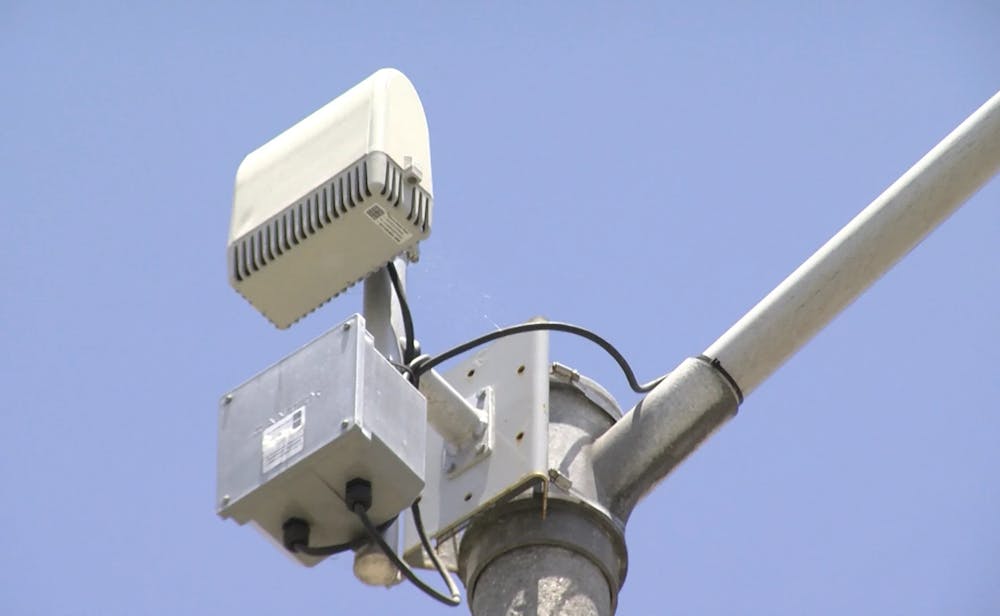Durham City Council voted Monday night to not extend the city’s contract with ShotSpotter, the company behind the controversial gunfire detection software that has operated in the parts of the city since November 2022.
Council members voted 4-2 to reject a three-year contract with ShotSpotter — now known as SoundThinking — whose services drew criticism from community members and failed to pick up a drive-by shooting in January 2023 and two deadly shootings in February 2023.
Mayor Leonardo Williams and Mayor Pro Tempore Mark-Anthony Middleton voted in favor of the contract, while city council members Nate Baker, Javiera Caballero, Chelsea Cook and Carl Rist voted no. Councilmember DeDreana Freeman was absent.
Chicago recently dropped ShotSpotter in February after Chicago Mayor Brandon Johnson had campaigned on ending the city’s use of the service.
The technology uses audio sensors placed around downtown to detect gunshots and notify 911 operators in an effort to reduce response time. Police then arrive at the scene in patrol cars without flashing lights or sirens to investigate the alerts.
Durham’s one-year trial program with the service ended in December, and renewing the service would have cost the city $650,000.
Council members who voted against renewing the contract argued that data showed the program was not useful enough to justify the cost and could potentially be harmful to communities.
“The data at this point is inconclusive,” Caballero said. “This is not a decision that I think is worth paying for.”
ShotSpotter was initially piloted in the 2022-23 fiscal year and ran for 12 months, ending in December. With the first three months being free, the remaining nine months cost the city $197,500.
Data from the Durham Police Department during the one-year pilot period recorded 1,416 ShotSpotter alerts, with a total of 5,259 shots detected. New Year’s Eve, New Year’s Day and Independence Day were not included in the total count.
DPD response to ShotSpotter alerts resulted in 24 arrests during the pilot period, with 26.9% of alerts accompanied by a resident 911 call.
Analysis from the Durham Police Department found that ShotSpotter did not have a significant impact on gun violence. There was an 11% increase in shootings from 2022 to 2023 despite the employment of ShotSpotter in the area.
On Thursday, Phillip Cook, ITT/Terry Sanford distinguished professor emeritus of public policy studies, presented findings to the City Council from a study conducted by Duke Law School’s Wilson Center for Science and Justice.
The study found that police could not confirm if a shooting happened for 91% of alerts without a corresponding 911 call. However, the data analysis also showed that the technology helped police reduce the median response time to confirmed shootings by 88 seconds from the year prior and helped save one life.
“I’m sorry it was just one life,” Middleton said. “It was just one year. Who knows what would happen if it were on years from now?”
Charlotte similarly ended their contract with the company in 2016, pointing to the service’s failure to help police make arrests or identify crime victims.
Durham Police Chief Patrice Andrews spoke in favor of the technology at Monday’s city council meeting, pointing to the fact that 80% of shooting reports to police were initiated by ShotSpotter. Nevertheless, she maintained that she “respected [the] council’s decision.”
“ShotSpotter is a tool,” Andrews said. “It’s just one more tool in our whole repertoire.”
Get The Chronicle straight to your inbox
Sign up for our weekly newsletter. Cancel at any time.

Zoe Kolenovsky is a Trinity junior and news editor of The Chronicle's 120th volume.

Jazper Lu is a Trinity senior and centennial/elections editor for The Chronicle's 120th volume. He was previously managing editor for Volume 119.

